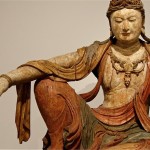This text “the 37 practices of a Bodhisattva” is a concise text written by a Tibetan teacher in the 14th century named Togme Zangpo who was a member of the Sakya lineage. It’s a summary of how we should behave as we are on the path to awakening. It’s a Tibetan Mahayana teaching.
1
Right now, you have a good boat, fully equipped and available — hard to find.
To free others and you from the sea of samsara,
Day and night, fully alert and present,
Study, reflect, and meditate — this is the practice of a bodhisattva.
Zangpo starts with telling us how significant it is that we were lucky enough to be born into a human life, into a situation where the Dharma is available. It’s because we are fortunate enough to be born into the situation that we’re in that the Dharma is available to us and we are able to practice.
The fact that we are able to share this teaching in this way shows that we are in a fortunate situation. We have access to the Dharma, more access than anyone has ever had in the past. Zangpo refers to this life as a great ship.
Just as a ship can take us from one shore to another, our human life can take us from the shore of suffering to the shore of Enlightenment.
The Bodhisattva path is dedicated to freeing ourselves and others, and that’s what he’s talking about here. Being fully alert and present is our cultivation of awareness and mindfulness.
Studying, reflecting, and meditating are the three tools we are using to guide us on the path.
2
Attraction to those close to you catches you in its currents;
Aversion to those who oppose you burns inside;
Indifference that ignores what needs to be done is a black hole.
Leave your homeland — this is the practice of a bodhisattva.
This is a description of the three poisons.
These are said to be the three negative emotions that cause us the most suffering. They are the ones that prevent us from realizing our enlightened true nature.
They are usually called Greed, Hatred and Delusion and sometimes they’re called Attachment, Aversion, and Ignorance.
The three poisons are caused by ignorance of our true nature and ignorance of our enlightenment. Coming from ignorance, these poisons motivate us to make mistakes and act in ways that are outside our own interest and cause harm to ourselves and others. Many of our actions are tainted by these poisons. They exist within us lust, craving, anger, jealousy and confusion. These poisons can ruin us.
The teachings of the Four Noble Truths really tell us that when we come to understand suffering and the causes of suffering, that’s when we can suffer less. We can takes the steps necessary to overcome these causes.
Greed is our selfishness. Our desire, attachment and yearning for happiness and satisfaction from external sources. It is our impulse to always want more. We want the objects of our desire, regardless of what those are, to bring us permanent satisfaction so we can feel complete. It helps to think about the accumulation of wealth. Money is made up of numbers and numbers never end, so we can chase that forever if we are obsessed with how much is in our bank account.
When we believe that our fulfillment is dependent on what we have, then we come to realize that we don’t really get the same satisfaction we were expecting. We always want more. Greed can affect our relationships, our jobs, and everything else.
Greed can also manifest as a lack of generosity.
Hatred is our anger, aversion toward things we don’t want, whether that be unpleasant people, circumstances, or even toward ourselves. It can manifest as anger, but also as impatience, ill-will, annoyance and hostility. We habitually resist and avoid feelings, circumstances, and people that we don’t like. We really want everything in our lives to be pleasant. This is nothing but a reinforcement of our illusion of duality and separation. Hatred puts us in a cycle of always finding something wrong.
When we are carrying hatred, our minds are frantic. We can’t be calm. We have a very easy time getting obsesses with whatever conflicts we are in. We can also have a conflict within, a hatred for our own feelings that we don’t like. With hatred we create enemies out of those around us and out of ourselves.
Delusion is our confusion and our misperception of reality. This is our lack of ability to understand the nature of things as they are—free of our labels and preconceptions. Under delusion we aren’t in harmony with the world around.
Without right perception, we don’t understand the way things are interdependent and impermanent. Because of this we are always looking outside ourselves for satisfaction. Because of our delusion we don’t understand our true nature.
The teachings of the Buddha tell us that our true nature is enlightened—that this will be realized if we can just see through our layers of ignorance. The goal of our practice is to free ourselves from these three poisons so we can see our true nature.
To overcome these poisons we have to first learn to notice them when they arise. When we are mindful and aware, we can recognize these things coming into our minds.
Leaving your homeland refers to just putting the past in the past instead of holding onto it. Our pasts have shaped who we are and we are often just lost in the things that have happened to us, letting them color all of our perceptions.
3
Don’t engage disturbances and reactive emotions gradually fade away;
Don’t engage distractions and spiritual practice naturally grows;
Keep awareness clear and vivid and confidence in the way arises.
Rely on silence — this is the practice of a bodhisattva.
Disturbances refers to things that we’re really attached to, or things that really bothers us. When we can put down our feelings about these things, then they don’t harm us as much. Slowly these disturbances can fade, or at least their hold on us can.
If we can put down these things that disturb us, whether we want them too much or we want to get rid of them too much, then our practice can flourish. In this way our awareness and our confidence in the Dharma can grow.
4.
You will separate from long-time friends and relatives;
You will leave behind the wealth you worked to build up;
The guest, your consciousness, will move from the inn, your body.
Forget the conventional concerns — this is the practice of a bodhisattva
When we think in terms of impermanence, this is obvious. Ken Mcleod says: “We and our loved ones are like leaves falling from a tree that are blown by the wind.”
We are going to part, sooner or later, from everyone we care about. This is sad, but obviously true.
Shantideva said: “As giving away all comes together (with death), it’s best to give (now) to others.”
I’m reminded of a t-shirt I saw that said: “He who dies with the most toys…still dies.”
I think that’s an important message. Don’t get so caught up in accumulating things. You can’t take it with you.
Ikkyu said: “This world is but a fleeting dream, so why be alarmed at it’s evanescence?”
When become more aware of how fleeting this human life we have is, how temporary everything is, then maybe we can realize we don’t need to be so pre-occupied with everything all the time. Because of this we can take advantage of this opportunity, this precious human life, this chance to put the Dharma into practice.
—————————————————————————–












